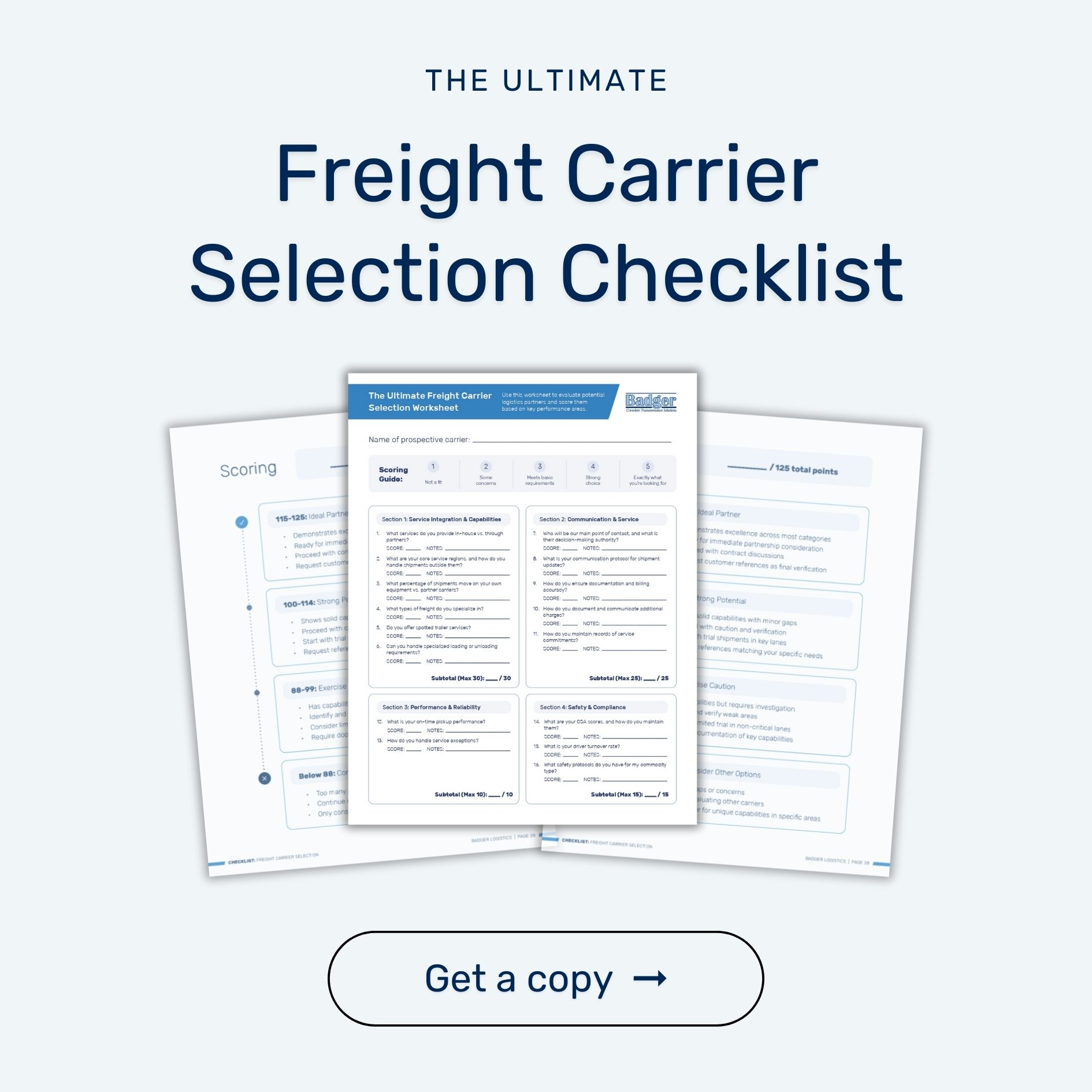Key takeaways
- Modern freight brokers are strategic logistics partners who connect shippers with vetted carriers while managing the entire shipping process from booking to delivery.
- A quality broker maintains a carefully vetted carrier network, handles multiple freight modes (dry van, reefer, flatbed, etc.), and combines technology with personal service for reliable execution.
- The best brokers provide both flexibility to handle varying shipping needs and stability through consistent service, maintaining 95%+ on-time delivery rates and minimal claims.
- When choosing a broker, focus on their business stability, service capabilities, technology systems, customer service approach, and verified performance metrics.
- Look for brokers who excel at problem-solving and maintain strong carrier relationships — because in transportation, challenges will arise, and you need a partner who can handle them effectively.
Badger Logistics delivers expert partial shipping services for reliable and efficient transportation of your mid-sized freight. Learn more about our partial freight services and get a competitive rate quote to join hundreds of shippers discovering a better alternative to traditional LTL.
A brief introduction
After nearly two decades in freight brokerage, including running my own flatbed department before joining Badger Logistics, I've seen this industry from every angle.
Today, I want to break down exactly what freight brokers do, how we create value for shippers, and what to look for when choosing a brokerage partner in 2025.
The evolution of freight brokerage
Freight brokerage started as a simple concept: connecting shippers who need to move goods with carriers who have available capacity. But in today's complex logistics landscape, that role has evolved significantly. Modern freight brokers are strategic partners who solve complex transportation challenges while managing risk and ensuring compliance.
The brokerage industry emerged largely because asset-based carriers couldn't efficiently serve all shipping needs.
For instance, at Badger, we initially developed our brokerage division because our asset-based operation was turning down opportunities. A shipper might need service in areas where our trucks don't regularly operate, or they might need specialized equipment we don't maintain in our fleet. Rather than simply saying "no," we can leverage our brokerage network to find solutions.
Today's freight brokers handle everything from standard dry van shipments to complex multi-mode movements requiring specialized equipment and permits. We've become problem solvers who understand not just transportation, but the broader supply chain challenges our customers face.
Core functions of a freight broker today

1. Carrier sourcing and vetting
One of our most crucial functions is maintaining and vetting a reliable carrier network. At Badger, we work with over 15,000 carriers, but we don't just add anyone to our network. Our vetting process is thorough and ongoing because we understand that our reputation depends on the performance of our carrier partners.
|
Here's what our vetting process looks like:
|
2. Mode and equipment matching
Modern freight brokers handle virtually every type of freight movement. At Badger, we've expanded from primarily dry van to handle:
| Full Truckload Services |
|
| Partial Load Services (typically 4+ pallets or 4,000+ lbs) |
|
Each mode has its own complexities. For example, flatbed shipping isn't just about having an open deck — you might need a standard flatbed, step deck, Conestoga, RGN, or specialized multi-axle trailer. Even something seemingly simple as tarping requires expertise — you need road-grade tarps, not hardware store tarps that will tear up.
3. Rate negotiation and management
Understanding freight rates requires deep market knowledge. Rates fluctuate based on numerous factors:
|
Seasonal Influences:
Market Conditions:
Load-Specific Factors:
|
In today's market, especially post-COVID, we're seeing unprecedented rate volatility. Contract rates are starting to come down while spot rates are going back up. A good broker understands these dynamics and can help shippers navigate them effectively.
3. Shipment execution and monitoring
This is where the rubber meets the road. Once a load is booked, we handle:
|
Pre-Transit:
During Transit:
Post-Transit:
|
At Badger, we take a balanced approach to technology and personal service. While we have modern TMS systems and tracking capabilities, we believe in maintaining human connections. When problems arise, having a relationship with someone who can solve problems is invaluable.
The value of a strategic brokerage partner
There are a ton of brokerages out there — but only a fraction of them can actually help you with logistics strategy. There are three reasons you want to find and work with these brokerages specifically.
Flexibility and problem-solving
Flexibility is one of the main advantages of working with a broker.
- Here's a real-world example: We have a customer who ships dry van freight throughout summer months, but in winter, their product could freeze. They need to switch to temperature-controlled equipment. If they worked directly with a carrier, they'd be limited to that carrier's equipment types. Through our brokerage network, we can seamlessly transition between equipment types as needed.
- Another example: When a customer suddenly needs to ship to Arizona, but their regular carrier doesn't service that area, we can quickly source a qualified carrier through our network. This flexibility allows shippers to say "yes" to new business opportunities without worrying about transportation constraints.
Managing risk
Risk management in freight brokerage goes beyond basic insurance coverage. We help manage risk through:
| Insurance and liability |
|
| Compliance |
|
| Operational risk |
|
Market intelligence
A good broker serves as your eyes and ears in the transportation market, providing valuable insights that help you make informed decisions. For example, we continuously monitor market conditions, including current rate trends by lane and mode, capacity availability, seasonal challenges, regional market dynamics, and industry news that could impact your operations.
Beyond keeping you informed, we also identify optimization opportunities to enhance efficiency and reduce costs. Our recommendations cover mode selection, consolidation opportunities, route optimization, scheduling improvements, and strategic cost-saving measures.
Choosing the right freight broker
After 15 years in this industry, I've seen what makes broker-shipper relationships succeed or fail. When you're evaluating a potential freight broker, there are several critical areas you need to examine carefully.
Let me walk you through what I'd look for if I were in your shoes.
|
Here's something many shippers overlook: ask about their process for handling exceptions. In transportation, problems will eventually arise — weather delays, equipment breakdowns, facility issues. What separates good brokers from great ones is how they handle these situations.
- Do they have 24/7 support?
- How do they communicate problems?
- What resources can they bring to bear when things go wrong?
These are the questions that help you understand what kind of partner you're really getting.
A few thoughts on the future of freight brokerage
The brokerage industry continues to evolve, with more digital freight matching platforms and automated solutions entering the market. However, I believe the most successful brokers will be those who combine technology with strong personal relationships and industry expertise.
We're seeing this play out in several ways:
| Technology integration |
|
| Personal service |
|
The key here is finding the right balance. Technology should enhance service, not replace the human element that's crucial for solving complex logistics challenges.
Final thoughts and next steps
A freight broker should be more than just a middleman - they should be a strategic partner in your supply chain. The right broker brings value through their carrier relationships, market knowledge, problem-solving abilities, and commitment to service.
In my experience, the most successful broker-shipper relationships are built on trust, communication, and mutual understanding of business needs.
At Badger Logistics, we've built our brokerage operation on these principles, combining the personal touch of a family-owned business with the capabilities of a modern logistics provider. Whether you're shipping one load or managing a complex supply chain, understanding how freight brokerage works is crucial for making informed decisions about your transportation strategy.
Jump to:
Need a better brokerage partner?
Join 500+ shippers solving 95% of their freight challenges with one call.






